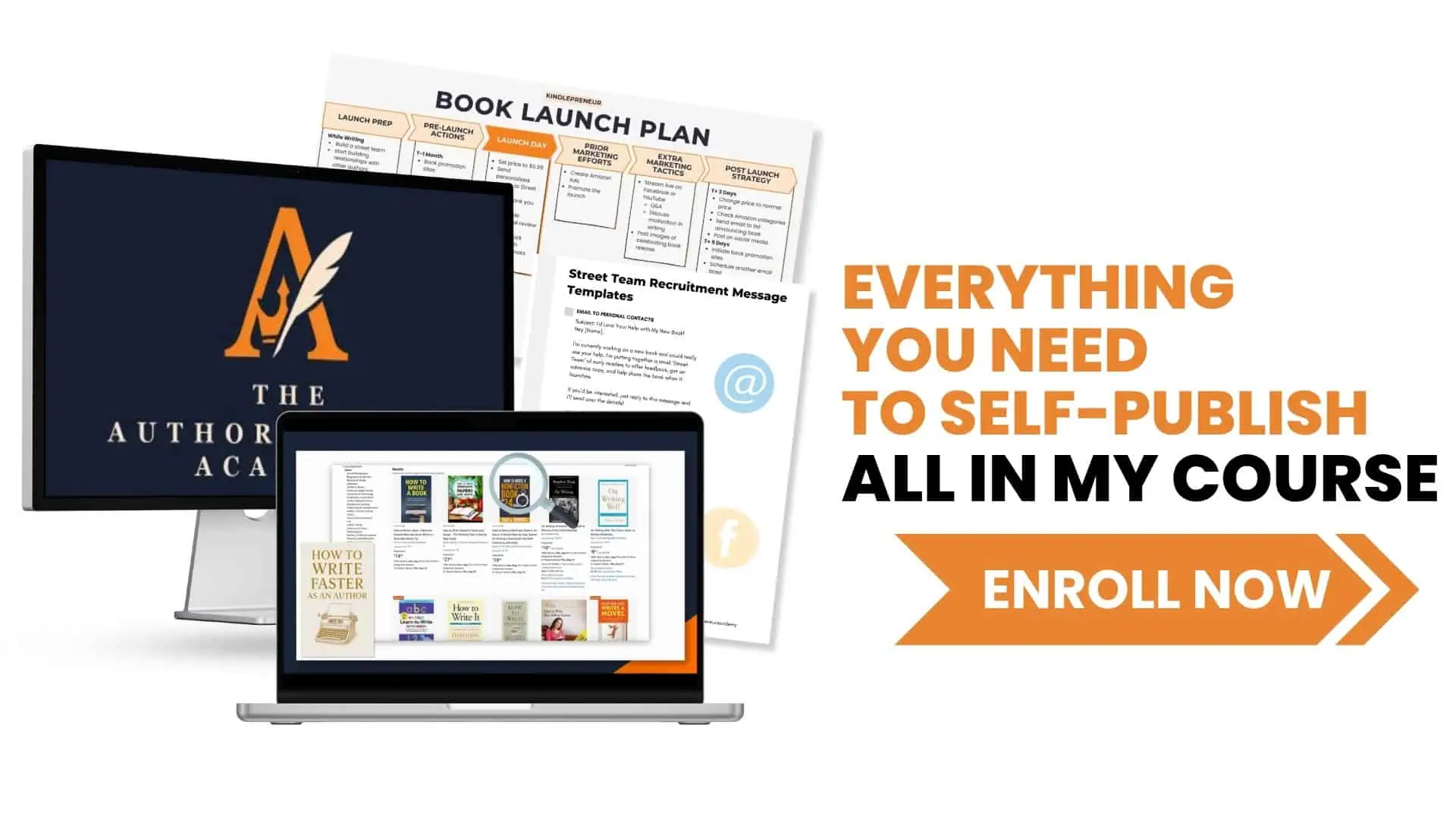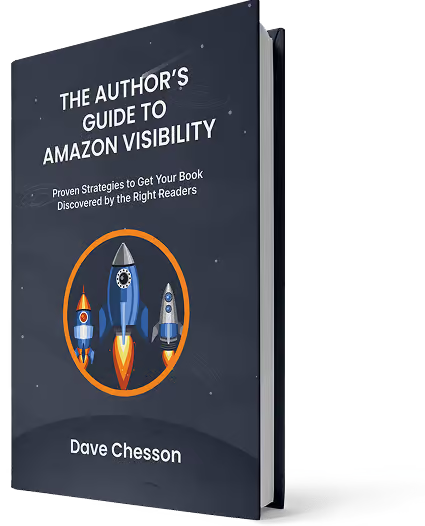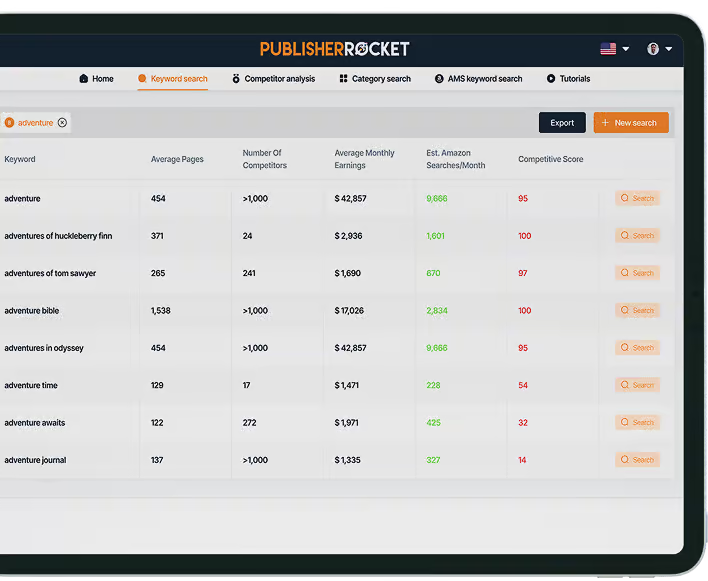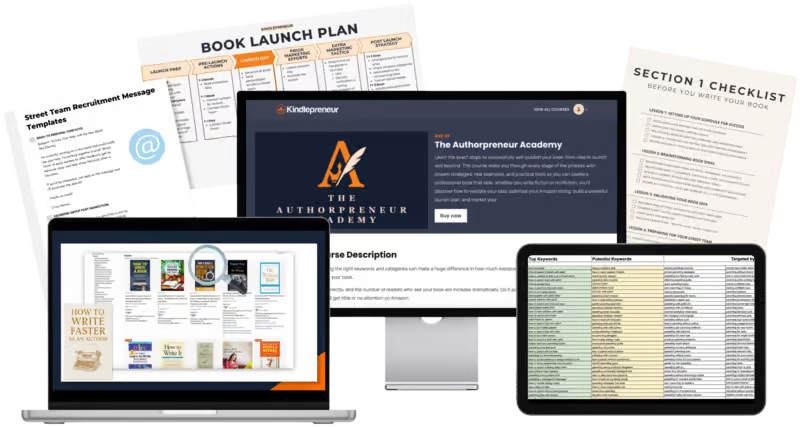So…
You wrote a book and now you want to sell it on Amazon.
First, congratulations! Second, you've come to the right place.
Over the years, I've helped thousands of independent authors learn how to sell books on Amazon. I've even had the pleasure of working with some New York Times bestselling authors too.
And in this article, I'm sharing 70 of my favorite book marketing tips.
Before diving in, two quick notes…
- Links in this article may earn me a small commission if you use them to purchase a service or product. This has not affected my opinion. However, it helps me continue to write these awesome articles that anyone can read for free!
- This article is not about selling used books or old books as an Amazon business. Here’s a great article on individual seller accounts, Amazon Seller Central, selling non fiction books, comic books like new, and Amazon FBA vs. FBM.
With that out of the way, let's get started…
#1. Collect an Email List
One of the easiest ways to build a platform is to compile an email list of readers and authors interested in what you have to say.
Perhaps you have an author website, a WordPress blog, a YouTube channel — whatever it is, you should be pushing your email list like it’s your number one marketing service.
On this email list, provide value. People will unsubscribe if your email marketing is too spammy or unhelpful. Give your readers book recommendations, tips on how to start writing a book, or a handy list of marketing tips.
#2. Utilize the Best Email Service
What is the best email service for authors? The absolute best email service for authors to use is GetResponse or MailerLite. Both offer authors a great way to communicate with their readers in effective and easy-to-understand ways.
Check out this MailerLite for Authors Course or my side-by-side review of Aweber vs. Mailchimp vs. GetResponse.
#3. Convince Your Email List to Leave Reviews
When you do publish a book, you should mention your new book in every email to your subscribers.
Whether it’s at the bottom or at the top of the email, let your readers know you have a book they can buy. Also, convince your email list to leave you reviews. If they subscribed to your messages, they are more likely to not only buy your book, but leave you a positive review.
Read more in my article on How to Get Your Email Subscribers to Leave Quality Reviews.
#4. Use Email Surveys to Sell More Books
This is a fun trick I learned from Brandon Cullum. Ask your growing email list to take surveys that make it feel like they’re helping you write your book.
When you publish the book, they feel like they contributed, making them more likely to buy the book and hopefully leave some good reviews.
Learn more: How to Use Surveys to Sell More Books by Brandon Cullum.
#5. Gather a Book Launch Team
Gather friends, family, colleagues, etc. to form a book launch team. Particularly for self-publishers, this group is crucial for author support, early book reviews, and word of mouth.
Some on your team will do this because they love you. Others may need an incentive, like a giveaway or premium content from your website or email list.
Read more in our comprehensive article: How to Build a Launch Team for Your Book
How do I market my book to my friends and family? A great way to market your book to friends and family is to include them in the marketing process. Many friends and family will be thrilled to take part in your launch strategy.
#6. Optimize Title & Subtitle
You need to optimize your title and subtitle for Amazon’s and Google’s search engines. Every genre has unique keywords that readers look for — even subconsciously.
For romance, “heart” and “passion” are great words to include in titles and subtitles.
For sci-fi, “star” and “planet” are common words that attract potential readers.
For self-help, “how to” and “definitive guide” will key the right reader in on your book’s topic.
Have you checked out our article on the Best Book Title Generators?
#7. Choose the Right Kindle Keywords
Every author has to choose the right Kindle keywords because it’s how Amazon decides which search terms they should put you in the search results.
Amazon lets you add 7 keywords to your book. Use keywords that readers are searching, that shoppers will pay for, and that doesn’t pose much competition.
What is the best way to promote a book? The best way to promote a book on Amazon is using targeted Amazon ads that capitalize on your keyword strategy. Another great promotion tactic is to build an author platform over the course of several years.
#8. Hire a Cover Designer
Especially for first-time authors, your book cover is your number one marketing tool. A professional-looking cover makes readers think that your book is generally high-quality. If you’re looking to draw readers in, an intriguing cover makes readers want to know more.
I implore you to hire a professional cover designer, such as:
If you really want to create your own cover, Kindlepreneur has a great mastery guide on Book Cover Design. It’s totally free to read! Additionally, check out Derek Murphy’s in-depth DIY Book Covers software and training.
#9. Nail Your Social Media
How do I market my book on social media? You need to market your book on social media in order to increase impressions, engagement, reader base, and other factors that can sell books.
For most self-publishers, I recommend setting up a professional author page on Facebook, maintaining a presence on Goodreads, logging onto LinkedIn, and creating video content on YouTube if possible.
I’ll go into more detail on individual social media platforms below. Stay tuned!
#10. Beseech High-Quality Book Reviewers
High-quality book reviews can get your book in front of a lot of new eyes. Readers gain a special connection with reviewers they trust. A word from these high-quality book reviewers can influence all their loyal listeners.
That’s why I wrote an article on How to Get Free Book Reviews Without Having a Blog, Email List, or Begging.
Check out Kindlepreneur’s list of Best Book Review Blogs.
#11. Skip Pre-Orders (Most of the Time)
While there are some benefits to pre-ordering, I recommend most self-publishing authors avoid the downsides of pre-ordering.
When you open your book up for pre-orders, Amazon penalizes you if your pre-sales don’t perform well. After publishing, Amazon rewards you if your sales are consistent by promoting your book closer to the top of ranking.
However, IF you have a large following or can market consistently during the preorder period, then by all means go right ahead.
Watch this video to learn all the reasons I say don’t do pre-orders unless you’re famous or already have a substantial following.
#12. Thrive With Publisher Rocket
Formerly known as KDP Rocket, Publisher Rocket can help authors with the marketing of their book or Kindle eBook. The 4 things Publisher Rocket can do for you:
- Find the best categories for your book
- Create efficient, effective Amazon ads for your use
- Show you what popular authors are doing, how much they’re earning, and much more
- Help your book get discovered by more Amazon store customers
There are many more benefits to Publisher Rocket, but you can read more about it in my in-depth review: Publisher Rocket Review.
#13. Set Up an Author Website
You have to set up a high-quality author website to funnel readers from retailer and social media platforms to one focused destination.
On your website, you should have books available for purchase, upcoming new books, a riveting About the Author page, and preferably some well-written blog content to offer potential readers added value.
Check out this awesome read: 5 Ways to Sell Your Book on Your Own Author Website.
#14. Use Consistent Branding
Across all social media platforms, your website, and even in-person appearances, I recommend using the same author logo, the same description of your book, and even the same signature.
Inconsistent branding can be confusing to potential readers.
Consistent branding makes a lasting impression on potential readers.
#15. Place Purchase Links on Everything
Make sure every platform you’re on features links to buy your book. Buy buttons should pop up everywhere.
Of course, you don’t want to overwhelm a potential buyer. But you’d hate for a reader to be interested in purchasing your book, then not see an easy link to click.
For example, check out this screenshot from Alexa Donne’s video on Red Herrings. Almost half the video description is devoted to links to buy her books:
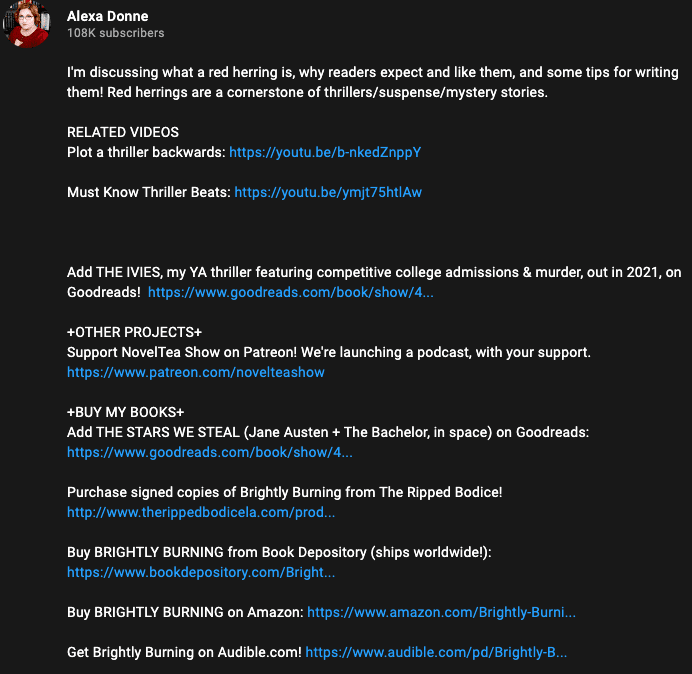
#16. Edit Your Book Correctly
Editing can feel boring, but it’s a crucial step that protects you from future bad reviews.
A poorly-edited book means unhappy readers who are pulled out of the story. They’ll likely want to leave a negative review and never buy a book from you again.
A well-edited book lets readers get lost in your world — and can mean less money spent on an editor.
#17. Hire an Editor
You need to hire a professional editor. I know, they’re expensive. But if you just have 2-3 grammatical errors or spelling mistakes in your book, 1 in 10 readers will put the book down right there.
Companies like Ebook Launch offer in-house editing alongside other services like cover design.
#18. Price Your Book Correctly
Ebooks cost from $2.99 to $3.99. Print books typically cost from $13.95 to $17.95 (plus shipping, if you're book isn't eligible for Amazon Prime shipping).
Except when running promos, you don’t want to undersell yourself. A very low price may indicate your product is cheap — worth the low pricing.
Unless you’re in high demand or a famous celebrity, don’t overcharge for your book either. A higher price can scare readers away.
#19. Run Promotions
Discount your book frequently. Especially if you’re a first-time author, a lot of readers are always looking for deals. I know, this sounds like it goes against what I just said, but discounting a book and poorly pricing a book are two different things.
Use these promos as marketing tools. Run Facebook Ads, Amazon Ads, BookBub Ads, write Instagram posts, and tweet about your book sale. Saving money excites people.
Heck, offer it for free — particularly if it’s the first book in a series!
#20. Network with Other Authors
You should be networking with other authors, especially in your genre, through writer’s conventions, big book fairs, book clubs, Facebook groups, etc.
This “marketing tip” doesn’t mean to be sleazy. Don’t make connections with other authors just as a tactic to sell more Amazon books.
Instead, approach networking like joining a mutual support group for people with the same passion as you. Sure, you may be able to cross-promote as a result of these relationships. But forming connections has to be personal and heartfelt, not sales-based.

#21. Go to Writer’s Conferences
I could write all day about how valuable these are. Personally, my whole life changed because I went to a particular writer’s conference. But I’ll save that story for later.
Simply put, go to writer’s conferences.
These are a great place where you can network with other authors, hone your craft, and get your name out there.
I go into more detail in this article: How To Get the Most Out of a Writer's Conference
#22. Make Sure Your Book Idea is Profitable
One great marketing tactic when figuring out how to sell on Amazon is making sure your book idea is profitable in the first place.
No, you don’t need a crystal ball; all you need is a little Amazon marketplace research. I recommend using Publisher Rocket and Incognito Mode.
Learn more about how to validate your book idea.
#23. Ensure Your Story Starts With a Hook
When marketing your book, you must ensure your story starts with a hook. The first sentence needs to grab the reader with a strong voice, a unique concept, an intriguing mystery, etc.
Many retailers offer readers a chance to read the first chapter of your book before they buy. Make sure your readers are hooked, so they end up clicking BUY.
Great examples of how to start a story with a hook:
- “It was the best of times, it was the worst of times…” Charles Dickens, A Tale of Two Cities, 1859
- “You better not never tell nobody but God.” Alice Walker, The Color Purple (1982)
- “It is a truth universally acknowledged, that a single man in possession of a good fortune, must be in want of a wife.” Jane Austen, Pride and Prejudice (1813)
- “It was a bright cold day in April, and the clocks were striking thirteen.” George Orwell, 1984 (1949)
- “They shoot the white girl first.” Toni Morrison, Paradise (1998)
Check out my article on How to Start a Story that Hooks Readers Right Away for more tips and tricks.
#24. Interact With Your Readers
Engagement is king, especially in the marketing game.
Social media knows when you interact with your readers, and it notices when this interaction encourages the readers to stick around longer on their site.
Respond to comments on posts — unless they’re inflammatory or from trolls. Respond to fan mail and email questions.
Encourage your followers to take surveys so they feel like they’re a part of your writing process. This is a great use of email lists. Publicize your appearances, webinars, and signings, so readers can interact with you in person. All of this makes people want to support you more.
#25. Pick the Perfect Categories
When picking your categories as an Amazon seller, you want to strike a balance between relevance and non-competitiveness.
If your category isn’t relevant, readers will be upset because they felt they were promised certain story elements by the category that the author didn’t deliver.
If your category is too competitive, you face little chance of becoming the #1 bestselling author in your category. If you make it to #1 in your category, that’s a huge marketing tool with lasting power.
From then on, you can boast in every piece of marketing that your book was #1 in whatever category on Amazon.
You can add extra categories by contacting KDP Support.
#26. Use Amazon Sales Rank Calculator
Kindlepreneur’s Amazon Sales Rank Calculator helps you convert the Amazon Best Seller Rank into an estimate of how many sales a book receives per day.
What can our Amazon Sales Rank Calculator do?
- Tell you how many people per month type the keyword into Google
- Tell you how many people per month type the keyword into Amazon
- Give a score from 1-99 telling you how competitive an Amazon kindle keyword is
- Tell you how much money other profitable books are making
- Give you key data so as to beat those books and rank better
If this sounds helpful, check out my article on the Amazon Best Sellers Rank Calculator, where I go into more detail about the functionality of this amazing marketing tool.
#27. Participate In Giveaways
People love free stuff. If you offer a chance at a giveaway in exchange for subscribing to your YouTube channel, signing up for your email list, etc., you’ll increase your outreach and your engagement.
A lot of books are free — more than you realize. It is one of the most successful book marketing strategies used by thousands of authors.
#28. Give, Then Ask
Although it may seem counterintuitive, you need to provide readers and prospective readers with “value” before you ask them to buy your book or join your email list.
Value simply refers to something they get out of the situation.
Examples of value you can provide your readers include:
- Blogging content on how to write and publish books
- Book reviews
- Special discounts and deals on books
- Sneak previews of your own books
- Engaging content on social media that makes your reader smile
When readers see value, they feel a connection with you. They feel that they have gained value in an exchange, and now they are more likely to buy your book on Amazon.
#29. Guest Blog
This is easier than it sounds if you know where to ask. A lot of bloggers are desperate for original, engaging content for their reader base. If you offer to guest blog on a unique topic, you may be able to expose your name and content to hundreds, if not thousands, of new eyes.
Not to mention you’re networking with this blogger, forming relationships that can be mutually beneficial in the future.
When offering to write a guest post, make your outreach personalized. People can smell when your email is copy-pasted and robotic. Take 5 minutes to skim their website, and personalize your message to match their brand.
If their blog is about science-fiction, don’t pitch a guest post about erotic fantasy. If their blog is about Christian books, it’s probably not wise to pitch a guest post about serial killers.
#30. Use Video to Grow Your Audience
Whether it’s on YouTube, Vimeo, your own blog — video is probably the strongest way to engage your audience and build your platform.
It’s also the most time-consuming. After writing, filming, and editing, you might expect a 10-minute video to eat up 10 hours altogether.
To make things less overwhelming, I wrote this practical article that will help you use video to grow your audience, build your author brand, and market your book.
#31. Build a YouTube Channel
Similar to the last item, consider building a YouTube channel.
Plenty of writers have skyrocketed their author platforms using a YouTube channel: Shaelin Bishop, Jena Moreci, Jerry Jenkins, Bethany Atazadeh, Vivien Reis. Out of the half-million subscribers between them, imagine how many more readers they have because they built their YouTube channel.
Read more: How to Use Youtube Videos to Sell More Books on the Cheap!
However, consistency is key. If you’re going to use YouTube, it won’t do you much good unless you keep to a regular upload schedule.
#32. Crack Open a Book on Marketing Books
You have books you sell on Amazon, right? When’s the last time you cracked open a book about… selling books?
Reading an entire book devoted to marketing books comes with its own brand of inspiration. And there are plenty of great books out there.
Check out my list of Best Marketing Books or watch the video below for more.
#33. Offer an Exchange
Offer readers a free look at your first four chapters in exchange for their email address, for example. This is a great lead magnet that boosts your email list and attracts new potential customers. Frequent readers love discounts like a free preview.
#34. Make That First Chapter Perfect
Using Amazon’s Look Inside feature, readers will be able to view the first chapter for free.
Because this will determine whether a lot of readers buy your book, you need to make that first chapter perfect. It should feature an immediate hook, your best prose, and no errors in spelling, grammar, or format.
#35. Write a Great Book Description
Also called a blurb, you need to write a great book description.
The summary that appears on the back of your book (or on your book’s Amazon sales page) is a new author’s third most important marketing tool (after a professional, intriguing cover design, and an error-free first chapter with a hook).
Check out Kindlepreneur’s amazing Book Description Generator to generate some great ideas. Or watch the video below.
#36. Perfect Your Author Website
You have an author website, right? Every author who means to make writing their career should have a website.
To perfect your author website, you need to:
- Esure your name is on every page for SEO purposes. I suggest putting your name and contact info in the footer that appears on every page.
- Provide a buy box with buy links to every one of your published books.
- Tease future titles with release dates.
- Link to social media.
- Encourage visitors to sign up for your email list.
- Write a killer About the Author page.
- Craft a modern, inviting website — not something that looks like a MySpace page from 20 years ago.
- Create engaging blog content, if you have the time. It will draw more readers to your website, and they’ll be more likely to buy your book once they see your engaging voice and thoughts.
My preferred web hosting company is SiteGround, but Squarespace and Wix are two other popular options.
#37. Create an Author Page on Amazon
Utilizing Amazon Author Central and creating an official Author page may make a huge difference in your sales and strengthen your legitimacy as an author. It also gives you certain capabilities on Amazon that help you convert readers into fans.
Check out Jeff Goins’s author page to see what a great Amazon Author page looks like:
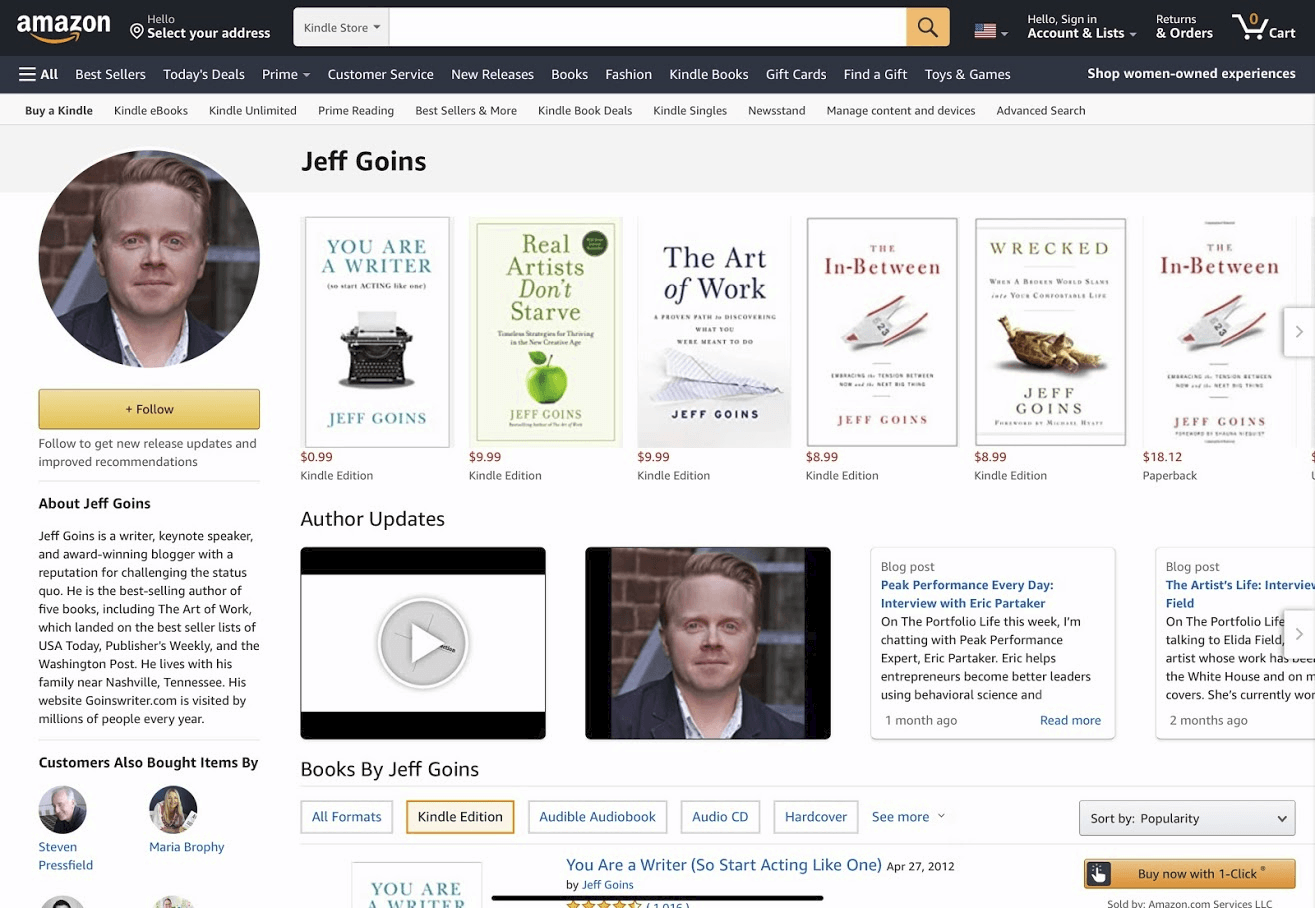
Ready to launch? Read my step-by-step guide on how to write a killer Amazon Author page.
#38. Use the Right Hashtags
That’s right. There are the right hashtags, and there are the wrong hashtags.
When using social media to increase your platform and promote yourself, some hashtags give you a better ROI while others are not worth the four seconds it takes to write them out.
Instead of doing your own research, I’ve done it for you. Kindlepreneur has a comprehensive list of hashtags that reveals the popularity and competitiveness of each.
(This was designed for X/Twitter, but they can easily work for Instagram as well.)
#39. Get on Instagram
You should get on Instagram if you're trying to market your book. Although you can’t include direct links in your captions, you can add a link to buy your book or visit your website in your Instagram bio.
Read more: Instagram for Writers & Authors
Instagram is also an excellent social media platform for connecting with potential reviewers, influencers, and show the behind-the-scenes of your writing and publishing process.
#40. Utilize BookBub
I recommend you create an author page on BookBub to encourage engagement and interaction.
BookBub is a free service that allows users to stay up-to-date with the latest and greatest in their favorite genres. BookBub analyzes your profile and selects genres to create a list of potential reads you might like.
Check out my review of BookBub.
#41. Set Up a Facebook Author Page
Setting up a Facebook Author Page is one of the easiest marketing tactics on this list. Everyone knows how to use Facebook. You’ve probably received at least one invite a month to your friends’ professional pages, be it Real Estate Agent or Professional Singer-Songwriter.
A professional Facebook page establishes legitimacy, encourages engagement, and is a great way to let your Facebook friends know when you start selling a book on Amazon!
Here’s Kindlepreneur’s article on How to Create a Facebook Author Page (And Tips for Using It Wisely), as well as How To Advertise A Book On Facebook. These are both invaluable resources for any writer, especially a first-time author.
#42. Test Cover Options With Facebook Ads
Another quirky way to utilize your Facebook author platform is testing cover options using Facebook ads.
Begin A/B testing using 2-3 different Facebook ads. Each ad uses a different book cover, but the same copy. The ad that receives the most engagement will give you a good idea of which book cover will catch the most eyes when browsing Amazon.
#43. Get the Most Out of GoodReads
GoodReads boasts almost 100 million users. Though some may disagree, it’s a valuable social media platform for authors to utilize.
To get the most out of GoodReads, read this article: The Ultimate Guide to Goodreads for Authors.
General note about book reviews: Don’t let the trolls get to you. On GoodReads, BookBub, Amazon — there are gonna be trolls who leave stupid reviews. These are completely different than thoughtful critiques that can shape your next book to be better. Don’t worry, be happy.
#44. Log On to Quora
Most people don’t talk about this, but Quora is actually rife with marketing potential. I wrote a handy article about How to Use Quora to Increase Traffic and Sell Books.
Quora is a higher-quality version of Yahoo Answers. People ask questions. If you answer them, you establish yourself as a legitimate authority on the topic.
So log on to Quora and establish yourself as an authority on questions concerning your genre, the publishing industry, writing process, and (if you’re lucky) questions about your specific book.
#45. Add Subscribe Buttons Everywhere
You wouldn’t want to lose potential readers just because they couldn’t find a button. Add subscribe buttons everywhere.
Without being annoying and spammy, make sure there are places to subscribe to your social media, email list, etc. on every page of your website, every social media platform bio, every video, every guest post, and every email you send out.
#46. Install Exit Pop-ups
Whenever someone is leaving your author website, there’s an easy way to install an exit pop-up box that kindly asks them to sign up for your email list before leaving.
This is a great way to build your email list and pull people off the fence about following you.
You may even want to hire a marketer to craft the perfect ads for exit pop-ups.
#47. Write a Compelling Author Bio
Write the best author bio you have ever read. Leave out the boring details. No one cares about where you went to high school.
Include intriguing details, impressive writing achievements, and most important a call to action at the end.
A compelling author bio might convince a few people to buy your book — especially in today’s age. If you can sell yourself as a voice that people need to hear, you can sell more books on Amazon.
#48. Do Amazon Ads the Right Way
Check out my FREE course on How to Do Amazon Ads the Right Way, or watch the informative video below. I couldn’t say it better myself.
What is the best marketing strategy for a self-published book? The best marketing strategy for a self-published book is methodical Amazon ad capitalizing on your keyword strategy.
#49. Find Profitable Amazon Ad Keywords
Amazon ad keywords are an important part of your book marketing plan. In order to find the most profitable 200-300 Amazon ad keywords, you need to put in just a little research.
If you’re in the stage of publishing and marketing where you need to find the right keywords for Amazon ads, I highly recommend you read this in-depth article: How to Find Profitable Amazon Ad Keywords
#50. Be Honest About Your Audience
Don’t try to market to the wrong crowd. You need to be honest with yourself about who your target audience is.
As much as it hurts, you can essentially ignore readers who are outside your target market. If your book is about knights and wizards, but doesn’t feature any dragons, don’t try to get dragon lovers to read your book.
#51. Be Honest About Your Sales
Be honest with yourself about how many sales you expect to make. No use setting yourself up for disappointment. Instead, set yourself up for success.
Set sales goals (while keeping any overhead or selling fees in mind) and reward yourself each time you achieve a sales goal. Examples of sales goals and what they would mean:
- 200 sales: Breaking even
- 100 sales/week: Eking out a living
- 1K sales: Celebrating with friends and family
- 20K sales: Full-on vacationing
This realism should help you maintain your mental health and strong momentum in your marketing efforts.
#52. Create a Target Reader
Be specific about this target reader (AKA proto-persona). It will help you focus your marketing efforts.
For example: “My target reader is Mark, a single 33-year-old man who works in tech and is too devoted to his job (and video games) to invest in a family.” Or, “My target reader is Joni, a 45-year-old divorced woman who loves to drink, post on X/Twitter, and schedule brunches.”
#53. Write a Book Press Release
Local papers and TV stations are starving for interesting content. A well-written book press release might grab the attention of a local newspaper or a book reviewer who can put your book in front of more eyes.
Read my article on Writing a Book Press Release or watch the handy video below.
#54. Take a Self-Publishing Course
Though not necessary for success, a self-publishing course taught by a professional greatly increases your chances for success in marketing and selling books.
Kindlepreneur details 4 of the best self-publishing courses on the market in this list.
Or, you can simply peruse through all the courses listed on Kindlepreneur’s website, most of which are not taught by me.
#55. Listen to Podcasts
If you’re reading this list, you obviously love gleaning inspiration and ideas. Don’t miss out on content with an audio format. Be sure to listen to relevant podcasts, where writers, editors, marketers, and publishing professionals talk for hours about their jobs and experiences.
Shameless plug time! My podcast The Book Marketing Show is a fun, informative resource for writers and self-publishers of all shapes and sizes.
Bonus tip: Try to land a guest spot on relevant podcasts. Most podcasts are looking for new, interesting personalities to host.
Check out Kindlepreneur’s list of The Best Podcasts for Writers.
#56. Make Business Cards
For conferences, book tours, everyday life, you should use author business cards. They’re crazy cheap to make, and they add an extra level of legitimacy to your author brand. (Also, consistent branding!)
Read my full article about Author Business Cards for more information on how these small cards can make a big difference.
#57. Proofread Your Book
Beyond editing your book, you need to proofread your book. This is typically one last look over your final draft before you officially publish.
Grammarly and ProWritingAid are both great proofreading tools, but which one works better for your situation? Watch this video to learn the pros and cons of each.
#58. Hire a Proofreader
This is less necessary than hiring a professional editor — which you need to do. The proofreader is often the final step before publishing. The proofreader makes sure there are no basic spelling or grammar errors. They often check for formatting errors.
Check out my list of the Best Proofreading Services You'll Ever Find for more info and links.
#59. Enter Writing Contests
Writing contests help get your name out there. They encourage interaction and networking with the writing community. They help you hone your craft. A lot of them are free.
And if you win, put it in your bio, post it on social media, and celebrate it in your email list.
Read more: The Best Writing Contests and How to Apply
#60. Change Your Kindle Keywords
You can change your book’s Kindle keywords anytime you want. It takes Amazon about 24 hours to reflect those changes. With the right keyword strategy, this tactic can revive a title that isn’t getting consistent book sales.
I wrote a detailed article complete with graphics, step-by-step instructions, expert know how — the whole spectrum of what to know when changing keywords. If you’ve already published your book on Amazon, this article is a must-read.
#61. Create a Mockup
A mockup is a 3D rendering of your book and cover. It looks more professional than just an image of your cover. A mockup is a must-have for high-quality marketing.
Some cover design services like Damonza provide a mockup included in most packages. However, you can make your mockup if need be. Watch this video to find out how.
In a similar vein, a book trailer is also a good idea for some genres, but you don’t want it to look cheesy. You may need to hire a book promotion expert or professional video editor to make a high-quality book trailer.
#62. Hire a Book Formatter
You can hire a professional book formatter or formatting service, such as Damonza or Ebook Launch, to make sure your book looks professional on the inside.
Yes, they can get expensive, but your book needs to be perfectly formatted. Otherwise, you alienate the readers who were willing to pick up this book and lose the future readers who would have evolved from those buyers.
An improperly formatted book looks strange, is distracting, and leads to negative reviews — which are bad for marketing.
Read my article on How to Hire a Book Formatter for more information.
#63. Format Your Own Book
Alternatively, you could format your own book. Unlike cover design or professional editing, self-published authors are more likely to have the tech savviness and time available to properly format their books.
Here are the 3 best tools to format your book:
Also, check out Kindlepreneur’s Mastery Guide on How to Format a Book.
#64. Consider Indie Bookstores
I know, we’re Kindlepreneurs here — we sell digital books, not physical books sold in physical bookstores! However, some indie authors would benefit from being sold in brick and mortar bookstores, especially indie bookstores.
It might also make you feel cool to bring your friends or family to a bookstore and see your name on the shelf. And it’s okay to want to feel a little cool from time to time. Read more: How to Sell Your Books in an Indie Bookstore.
(An added bonus: no Amazon fees!)
How do I get my book into Barnes and Noble? In order to get your book into Barnes and Noble, you have to email sjamison@bn.com with a detailed marketing strategy, EAN of your book, and the name of the distributor handling your fulfillment to the retail trade.
#65. Consider International Markets
In some cases, you may want to consider selling your book internationally.
If you’re on Amazon KDP (Kindle Direct Publishing), you’re automatically available in Amazon’s 13 international markets. However, to get any sales, you need to market your book specifically in those markets. Learn more in my Selling Books Internationally article.
#66. Ensure Keywords are in Your Description
Inserting your target keywords in your book description helps Amazon index your book for those keyword phrases. This gives amazon.com a stronger belief that you’re a good fit for those search queries.
However, stuffing all your target keywords into a book description for indexing purposes is not a good idea.
Read my article on Keywords in Your Book Description for more info.
#67. Make an Audiobook Version
Turning your book into an audiobook can be time-consuming and expensive. But it will set you apart from the competition.
More and more people only have time for audiobooks, listening in the car for instance. Reach that market, and your sales should rocket.
Check out Kindlepreneur’s article on How To Make An Audiobook.
#68. Decide If KDP Is Right For You
Amazon’s KDP Select might be awesome for your marketing strategy, mainly because it allows you to enroll in Kindle Unlimited. If you agree to list your eBook on KDP Select, you can’t list your eBook on any other retailer or offer your book for free.
However, Kindle Unlimited books will likely get preferential treatment in Amazon’s search results. I recommend all authors of fiction books try Amazon KDP Select and Kindle Unlimited for at least a year.
Read more in my article or watch the video below.
#69. Assemble a Great Beta-reader Team
In addition to an editor, a great ARC team, and your own expertise, it's handy to have a dedicated team of beta readers to help out.
Beta readers are great for giving you feedback from the reader perspective (which, let's face it, is the most important perspective). If several of your beta readers identify the same problem, then it's probably a good idea to fix that problem.
We recommend this great guide on how to build your beta-reader team.
#70. Don't Put All Your Eggs in One Basket
As the on-again, off-again TikTok ban showed us, it's important for authors to never put all of their marketing focus (or dollars) in a single platform.
Instead, you should diversify.
Be active on several social media platforms, not just one. Grow an email list. Build a blog.
If something unforeseen should ever happen (a social platform gets banned, Google penalizes your blog, your emails to subscribers head to spam, whatever), you'll be glad to have spread your risk around.
#71. Write a Great Book
Finally, you need to write a great book. Word of mouth might be the most powerful marketing tool at your disposal.
If your book is really special and spectacular, chances are readers will want to tell their friends about it.
Check out Kindlepreneur’s in-depth guide on How to Write a Book.













